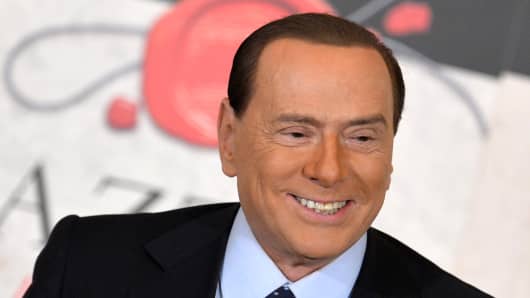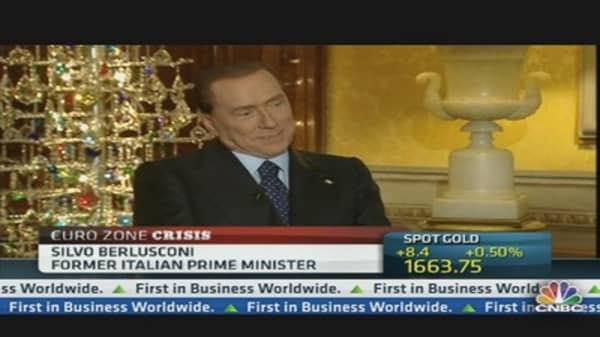Former Italian Prime Minister, Silvio Berlusconi, who is preparing to make a comeback in elections due in February 2013, has hinted at a conspiracy that toppled his government in November last year.
Speaking to Class CNBC, Berlusconi, who is Italy's longest-serving leader since the Second World War, despite an ongoing trial involving a sex scandal and conviction for fraud, described his 2011 resignation as a "coup d'etat".
He pointed the finger at one of Germany's largest banks for the spike in Italian bond yields, which rose above 7 percent in November 2011, forcing him to step aside.
"Deutsche bank imposed a sell-off of all its Italian and Greek government bonds. American and international investors questioned the move," he said. "Some assumed that the German bank had some specific information that nobody else had. It was a huge lie."
His resignation led to the appointment of technocrat Mario Monti as Italian Prime Minister, but Berlusconi said Monti's government had failed by pushing the economy into a worsening decline.
"The achievement of the technical government is clear," he said, citing the sluggishness of economic indicators since his departure. "The figures speak for themselves."
"We are broadly aware of the data: lower GDP, a public debt over 2,000 billion euro, unemployment shot up by more than 1 million, and youth unemployment at 36 percent," Berlusconi said.
(Read More: Berlusconi Says Italy May Be Forced to Leave the Euro Zone)
Gross domestic product (GDP) has fallen 2.4 percent from a year ago, according to data agency iSTAT. Italy's public debt has risen above 2 trillion euros ($2.6 trillion) for the first time in October, with the debt-to-GDP ratio moving to 126.4 percent from the 120.1 percent in 2011. Unemployment now stands at around 11 percent – the highest level in 13 years.
Despite the figures, Mario Monti has been praised by many including the Organisation for Economic Co-operation and Development (OECD) for the authoritative manner with which he has helped lower borrowing costs and avert a Greek-style debt crisis. Since Italy's stabilization, much of the media spotlight has fallen onto fellow euro zone struggler Spain.
Berlusconi said his "sense of responsibility", and the threat from leftist parties, has led him to run again for the premiership in elections slated for February 24.
"I feel the need to return to the political arena to prevent the country from being delivered into the hands of a leftish party that isn't at all social democratic, but has its roots firmly planted in the former communist orthodox party," he said.
Meanwhile, Mario Monti, who officially resigned on Friday, has left the door open for the possibility of returning to lead a second term, if he was approached by centrist allies committed to backing the reforms he has already put in place.
"Mr Monti may have decided not to run for office, but he has made it crystal clear where his political allegiances lie and that he's ready to head Italy's next government if asked," Nicholas Spiro, managing director of Spiro Sovereign Strategy said in a research note. "While he may not have thrown his hat into the ring, Il Professore has become Il Politico whether he likes it or not."
(Read More: Italy's Monti Opens Door to Seeking New Term)
'I Want More Europe'
Berlusconi said he hopes to reach the same 40 percent vote share the coalition led by his People of Freedom Party (PDL) got in 2008. His party currently languishes at 16 percent, some 14 points behind the center-left Democratic Party in opinion polls.
"I want more Europe. I wish we had Europe as was expected and dreamt of by our fathers like Schumann, Adenauer, De Gasperi - with a single economic, defense and political framework," Berlusconi said, adding that he would immediately give himself the right to appoint and dismiss ministers is elected.
Italian stock markets plunged earlier this month after the PDL Party withdrew its support for the Monti government and started the ball rolling in what is set to be two months of political uncertainty in the country.
Italian stocks fell 2.5 percent on December 10 and the 10-year Italian government bond yield jumped by a quarter percentage point to 4.75 percent. Trading in several Italian banks was also halted in Milan after they fell around 5 percent. However, markets have since returned to previous levels.
(Read More: Berlusconi's Back: Italian Banks and Bonds in Trouble)
Berlusconi told CNBC that he would opt for a change in the makeup of the Italian Supreme Court. A single branch of parliament would be allowed to approve a draft law in 90 days, he said, and he would make it possible for Italian citizens to elect the head of state directly.
"We will succeed only if one political party can win the majority in parliament. The majority should be then used to make the country able to compete with other western democracies," he said.




